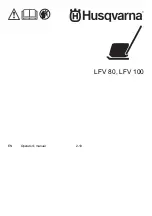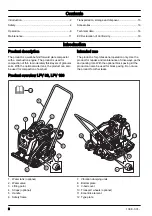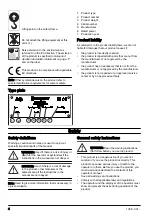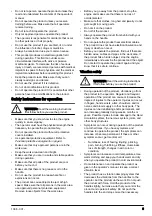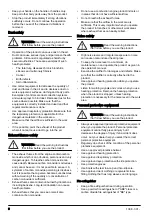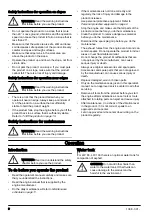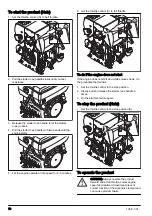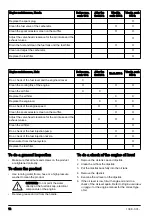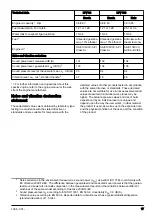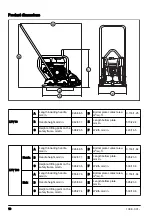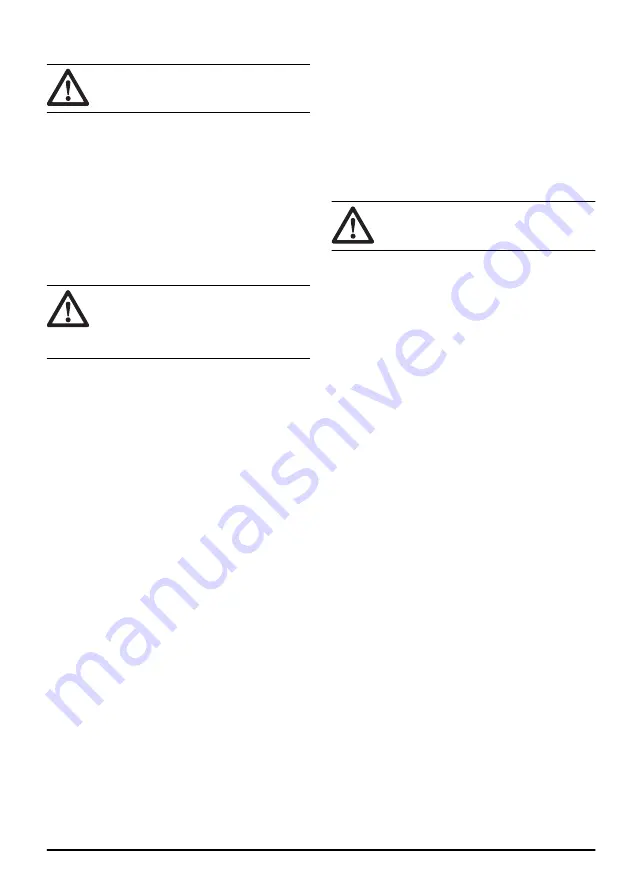
Safety devices on the product
WARNING: Read the warning instructions
that follow before you use the product.
• Do not use a product with defective safety devices.
• Do a check of the safety devices regularly. If the
safety devices are defective, speak to your
Husqvarna service agent.
Muffler
The muffler keeps the noise levels to a minimum and
sends the exhaust fumes away from the operator.
Do not use the product if the muffler is missing or
defective. A defective muffler increases the noise level
and the risk of fire.
WARNING: The muffler becomes very hot
during and after use and when the engine
operates at idle speed. Be careful near
flammable materials and/or fumes to prevent
fire.
To do a check of the muffler
• Examine the muffler regularly to make sure that it is
attached correctly and not damaged.
Engine ON/OFF switch (Honda)
The engine can only start when the engine ON/OFF
switch is set to "ON". The engine stops when you set the
engine ON/OFF switch to "OFF".
To do a check of the engine ON/OFF switch
1. Start the engine. Refer to
(Honda) on page 9
.
2. Set the engine ON/OFF switch to "OFF". The engine
stops.
Safety frame
The safety frame prevents damage to the product if it
falls. The handle and the lifting point are parts of the
safety frame.
To do a check of the safety frame
• Make sure that there are no cracks or other
damages on the safety frame.
• Make sure that the safety frame is correctly installed
on the product.
Vibration damping units
The vibration damping units decrease vibration in the
product. The vibration damping units decrease harmful
vibrations to prevent injury to the operator and damage
to the product.
To do a check of the vibration damping units
There are 4 vibration damping units, 2 on the left side
and 2 on the right side of the product.
• Make sure that the vibration damping units are
correctly installed.
• Examine the vibration damping units for damages
and wear.
• Replace the vibration damping units if it is
necessary.
Fuel safety
WARNING: Read the warning instructions
that follow before you use the product.
• Fuel is flammable and the fumes are explosive. Be
careful with fuel to prevent injury, fire and explosion.
• Do not breathe in the fuel fumes. The fuel fumes are
poisonous and can cause injury. Make sure that the
airflow is sufficient.
• Do not remove the fuel tank cap or fill the fuel tank
when the engine is on.
• Let the engine become cool before you refuel.
• Do not fill fuel in an indoor area. Not sufficient airflow
can cause injury or death because of asphyxiation or
carbon monoxide.
• Do not smoke near the fuel or the engine.
• Do not put hot objects near the fuel or the engine.
• Do not fill fuel near sparks or flames.
• Before you refuel, open the fuel tank cap slowly and
release the pressure carefully.
• Fuel on your skin can cause injury. If you get fuel on
your skin, use soap and water to remove the fuel.
• If you spill fuel on your clothing, change clothing
immediately.
• Do not fill the fuel tank fully. Heat causes the fuel to
expand. Keep a space at the top of the fuel tank.
• Tighten the fuel tank cap fully. If the fuel tank cap is
not tightened, there is a risk of fire.
• Before you start the product, move the product to a
minimum of 3 m/10 ft from where you refueled.
• Do not start the product if there is fuel or engine oil
on the product. Remove the unwanted fuel and
engine oil and let the product dry before you start the
engine.
• Examine the engine for leaks regularly. If there are
leaks in the fuel system, do not start the engine until
the leaks are repaired.
• Do not use your fingers to examine the engine for
leaks.
• Keep fuel in approved containers only.
• When the product and fuel is in storage, make sure
that fuel and fuel fumes cannot cause damage.
• Drain the fuel in an approved container outdoors and
away from sparks and flames.
1388 - 001 -
7

